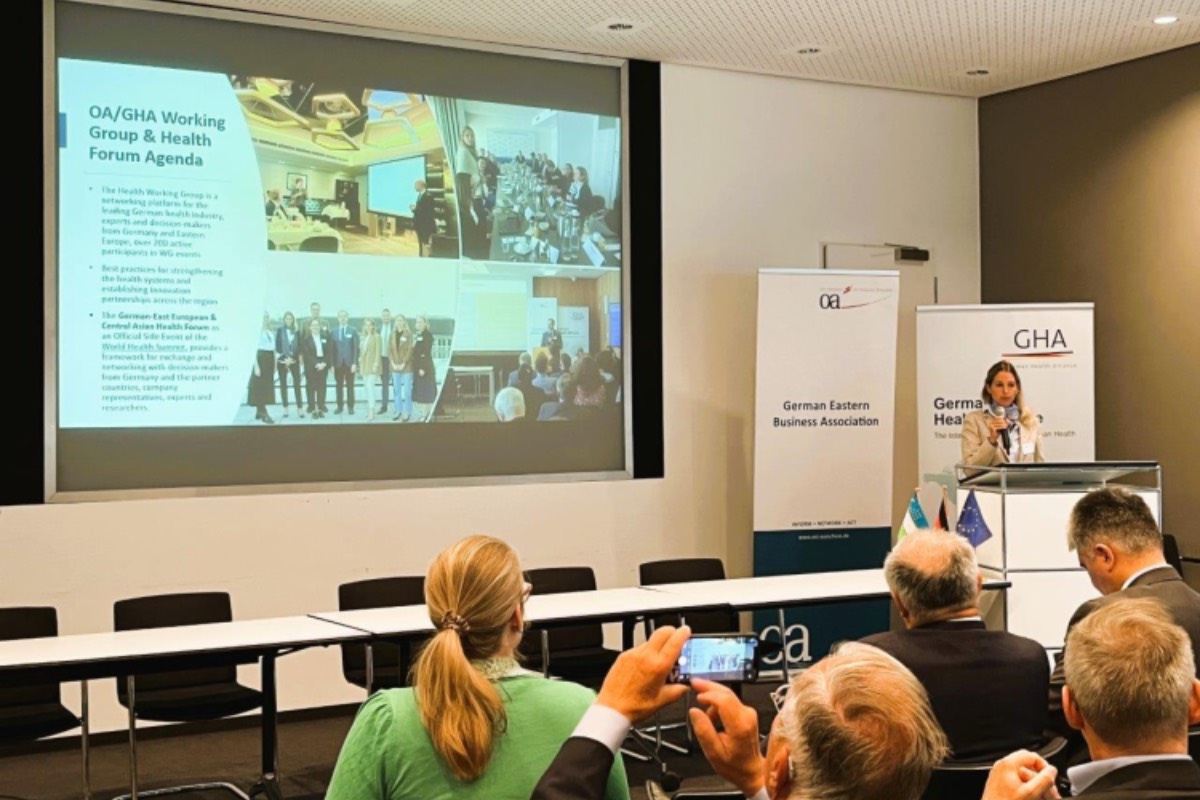On 13 October, the 6th German – Eastern European & Central Asian Health Forum of the German Eastern Business Association and the GHA – German Health Alliance took place in Berlin. The focus of the sixth edition with more than 100 participants was on investment in health, the creation of innovation centres, the (re)development of modern health infrastructure and partnerships to strengthen health systems. For the sixth time in a row, the official side event of the World Health Summit provided a framework for exchange and networking with decision-makers from Germany and partner countries, business representatives, experts and scientists. Keynote speakers were Prof. Amrillo Inoyatov, Minister of Health of the Republic of Uzbekistan, and Thomas Steffen, State Secretary at the Federal Ministry of Health in Germany.
Better access and stable financing framework for health systems in Eastern Europe and Central Asia
In recent years, health systems in Central, Eastern and South-Eastern Europe, the Southern Caucasus and Central Asia have developed significantly. Governments in the region have actively sought to improve health infrastructure and access to quality health services, as well as health policy reforms. Efforts have been made to improve health financing mechanisms and promote public-private partnerships to meet the health needs of the population. In addition, advances in medical technology and e-health solutions have played a key role in improving health care and treatment outcomes.
As the region evolves, stakeholders remain committed to promoting innovation, collaboration and cross-border cooperation to ensure sustainable and equitable healthcare development in Eastern Europe and Central Asia. This commitment and the resulting concrete projects were presented and discussed at the Health Forum.
Regional and sector expertise to strengthen partnership in growing markets
Stefan Friedrich, Partner International Business, Healthcare & Public Sector at KPMG, emphasised the importance of the healthcare sector for stable economic growth. Martina Unseld, Spokesperson of the Working Group on the Health Sector of the Eastern Committee and GHA – German Health Alliance, and GHA – German Health Alliance Chairman Roland Göhde, pointed out the important link between regional and sector expertise in modernising and strengthening the health systems in Germany as well as in Eastern Europe and Central Asia.
State Secretary Thomas Steffen addressed the importance of cooperation in the health sector against the backdrop of the escalating conflict in the Middle East and the ongoing war in Ukraine. Demographic trends and the ageing of society are placing an enormous burden on health systems, including in Germany, where 90 per cent of hospitals suffer from staff shortages. During the bilateral meeting in the run-up to the Health Forum, the cooperation of health professionals was discussed with the Minister of Health of Uzbekistan, Amrillo Inoyato. Inoyatov announced his intention to develop Uzbekistan into a medical and scientific hub in Central Asia through the exchange of experience of health professionals and health workers. The dynamic population growth of Uzbekistan to 36.5 million inhabitants today makes new projects in the health sector urgently necessary. Already today, there are more than 8,300 private medical institutions in Uzbekistan, employing 17,000 doctors and 26,000 paramedical specialists. By 2025, the private medical sector in Uzbekistan is expected to cover 50 to 60 percent of the current patient volume, thanks to favourable tax and housing conditions introduced since 2021. An impressive portfolio of projects was presented to the German companies, including 159 private hospitals with foreign investments from more than 20 countries – and the trend is rising.
Corporate social responsibility in the region and open communication with decision-makers
The panel discussion on “Partnerships to strengthen health systems”, moderated by Stefan Friedrich and Philipp Wacker from KPMG, covered a wide range of topics, including best practices of centralised procurement by the Ukrainian Medical Procurement Agency, corporate social responsibility combining commercial activities with research and development, with numerous examples from Central and Eastern Europe, and cooperation with humanitarian aid organisations. Transparent and continuous communication with decision-makers can mitigate long-term effects of over-regulation on health markets, including the exit of companies from the market.
Prof. Leonard Azamfirei, Rector of the George Emil Palade University of Medicine, Pharmacy, Science and Technology in Târgu Mureș (Romania), discussed the economic, political and financial components of three key factors for health systems – brain drain, ageing and distribution of medical staff. An excellent example of the win-win situation created by international knowledge exchange is the successful branch of the University of Târgu Mureș in Hamburg, which has been in existence since 2019.
Prof. Dennis Ostwald, Managing Director of the WifOR Institute and Professor of Economics and Management at the SIBE of Steinbeis University, emphasised the importance of health systems for sustainable and inclusive growth. Worldwide, the health economy contributes 6.3 trillion dollars to the global GDP and secures 194 million jobs. In Germany, every tenth job in the health sector leads to the creation of more than five additional jobs in the supply chain. These figures illustrate the importance of investing in health, which leads to better outcomes for individual and public health, economic growth and more resilient societies. A concrete use case: in order to develop strategies for sustainable financing of health systems, health metrics should be defined and integrated into the European Semester, which is the framework for economic policy coordination in the EU.
Finding a sweet spot between data protection and innovation
In another panel discussion, moderated by Rabea Knorr, Head of Department Industrial Health Industry (BDI), projects from all over the region – from Kazakhstan to Estonia – were presented that aim at personalised and high-quality health care with innovative solutions. The success story of digitalisation in Estonia presented in the discussion started in the early 2000s with the creation of an interface between different public systems. Online services should add value and run seamlessly in the background instead of copying a manual service. In the past, Kazakhstan’s vast territory was an obstacle to universal access to health care. Now digital tools, such as telemedicine, are being used as a solution for remote regions. The growing attention to strengthening healthcare also means a greater need for training, for example national training programmes for doctors and nurses, and training for medical technology and pharmaceutical companies.
Despite geopolitical challenges, it is crucial to make progress through sustainable health equity strategies and strengthening public-private partnerships – a key message of the 6th Health Forum, which was aligned with the World Health Summit’s theme “A critical year for action on global health”.

